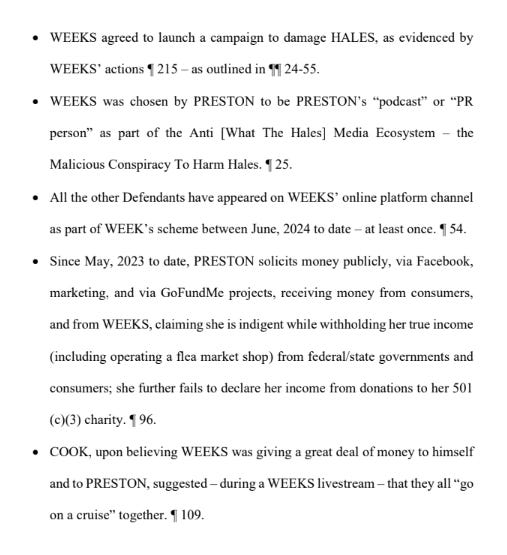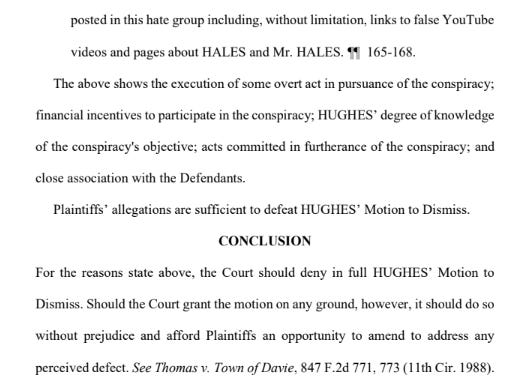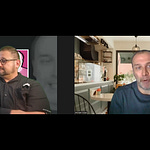
Richard Luthmann and I were back for episode 42 of The Unknown
We started by debating the LA riots. Both of us agreed the situation was critical, but we disagreed on President Trump’s course of action.
I argued that he again was misusing obscure laws to impose his will. He federalized the California National Guard under 10 U.S.C. 12406, which is to be used under a rebellion, invasion or “to execute the laws of the United States.”
I argued that this was a local problem, and the Los Angeles Police Department (LAPD) would need to deal with it.
The Diddy Trial
There were dramatic moments key for both sides in the Diddy trial as well. Until this broadcast, both Rich and I agreed that the prosecution’s case was largely built on emotional evidence which did not prove the elements of the crime that prosecutors charged Sean “Diddy” Combs.
To prove sex trafficking prosecutors must prove that Sean Combs got some person- Cassie is one- to have sex with other people through force, fraud, and coercion.
The problem thus far was that while they showed Combs coerced, beat, and otherwise controlled Cassie, they did not make a direct link between those acts and the sex parties she said she participated in.
That all changed late last week with no evidence from another ex-girlfriend.
In an audio message from Combs to "Jane" played in court, he warned she was "going to have a rude awakening, you will have silence" if she did not participate in "hotel nights" with him.
"I'm not going to be playing these games with you at all," he said in the message.
He then told her, "You got me on my job, it will never work like that over here, you need to get on your job," meaning his job of supporting her financially, and her job of taking care of him and making sure he's happy.
"[You] have left me no choice, you have me treating you," he said. "I am trying to be clear, I am going to disappear on you."
That was the smoking gun evidence- in Diddy’s own words- which I was looking for to show the elements of force, fraud, or coercion to have sex with other people.
The prosecution has problems of its own. Two of their witnesses were caught in a lie.
In the letter, filed June 7 in the Southern District of New York, Diddy's legal team argued that the prosecution knowingly presented false testimony to the court.
Jurors heard testimony last week from Cassie Ventura's friend, Bryana "Bana" Bongolan, who claimed Diddy dangled her off a 17th floor balcony in September 2016. Portions of her testimony were questioned after Bana couldn't remember details of the alleged incident, including what drugs she was on at the time.
"When the introduction of perjured testimony results in a criminal conviction, and 'the prosecution knew or should have known of the perjury, the conviction must be set aside ‘if there is any reasonable likelihood that the false testimony could have affected the judgment of the jury,'" Diddy's team wrote.
"Moreover 'the prosecutor’s knowing use of perjured testimony can violate the Due Process Clause even if it only undermines a witness’s credibility.'"
The judge denied the defense’s motion to dismiss, but the defense can- like in the OJ trial- now put prosecutors and the Federal Bureau of Investigation (FBI) on trial.
Furthermore, Cassie- who gave powerful testimony at the beginning of the trial- is now discredited as a witness.
The defense needs to convince the jury that if prosecutors were willing to suborn perjury in this case, they may have suborned it in all cases, and this is reasonable doubt.
What the Hales (WTH)
In the WTH segment starting approximately thirty-five minutes in, we discussed how frivolous the second lawsuit Jeremy Hales filed was. In that lawsuit, he charged eleven defendants, including Rich, with some vague conspiracy. Only, he provided no details of this conspiracy, except to say people recommended each other’s work and went on each other’s YouTube channels. This is from the most recent response filed by Hales attorney, Randall Shochet.
Bruce Matzkin, until recently, represented John Cook and Michelle Preston, where they are defendants in Hales first frivolous lawsuit. Hales is now suing Matzkin in his second lawsuit. Hales claims that Matzkin wrote mean emails to a lawyer for Whatnot, a company which partners with Hales, only, Matzkin’s attorney argued that Hales failed to show any evidence his business was interfered with.
Furthermore, Matzkin sent the emails while representing Cook and Preston, so he should be covered by litigation privilege.
So far, Shochet has filed an initial complaint, an amended complaint, and one response. He has failed to provide any substantive facts to back up his claims, despite asking for more than $10 million.
Interview with Arizona Republican State Representative Rachel Keshel
Rich and I also went over our recent interview with Arizona State Representative Rachel Keshel.
In particular, we discussed a portion of the interview where Representative Keshel talked about how the lobbying arm of the courts brought in a lobbyist to work against HB 2256, which would have banned the appointment of therapeutic interventionists without the approval of both parents. The bill passed but was vetoed by Democratic Governor Katie Hobbs.
Representative Keshel called it “unethical” for the court to lobby against bills it will then interpret.
It’s not the first time I’ve been exposed to the lobbying arm of the Arizona courts.
On its website the Arizona Judicial Council (AJC) appears harmless, calling itself, “a policy-making body that oversees the judicial system in Arizona.”
It is also a registered lobbyist with the Arizona Secretary of State’s office.
Aaron Nash, the communications director for the Arizona Supreme Court, said the AJC registered as a lobbyist only because they provide background information on the possible effects of proposed bills to the legislature.
Members of ADOG say it does far more than that.
Most recently, the AJC has been pushing a proposed bill which would give court security police power, Arizona bill SB 1064.
“Judges have great security now. SB1064 creates ‘peace officers’ with unlimited powers and authority to operate anywhere as ordered by Judges. It also allows the Courts access to any records they request. This would enable them to identify and then arrest political opponents and their friends, breaking down doors in the middle of the night,” Lynch said in an email to legislators.
While Nash acknowledged this is lobbying activity, he disagreed with the characterization of AJC as a lobbying group.
“The AJC includes court representatives and public members. Their work is conducted in public meetings and related materials are available online. The AJC can request legislative changes that are needed to carry out its directive of implementing policies and procedures and coordinating court services. The AJC votes on whether to support, oppose, or take no action on legislative proposals,” Nash said.
Courts lobbying the legislature creates significant separation of powers issues. Courts are to interpret the law. They are not to legislate from the bench, but if the courts have a lobbying arm, that’s exactly what they are doing.





















Share this post